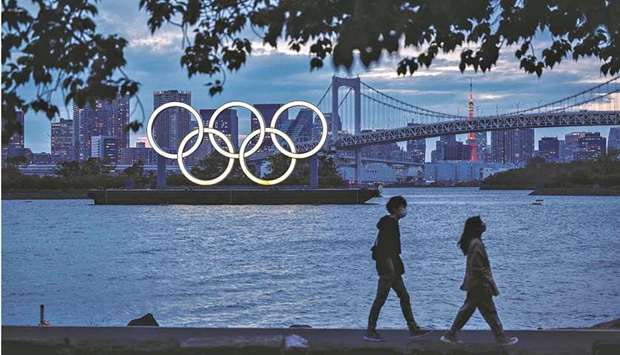Japan’s capital yesterday asked the government to extend until May 31 its state of emergency aimed at curbing coronavirus infections, a move that could spark more questions about its ability to host the Olympics.
Japan had hoped a “short and powerful” emergency would contain a fourth wave of infections just under three months before Tokyo is set to host the Olympic Games from July 23.
While the measure, now running from April 25 until Tuesday, has not curbed the spread of infections, continuing it until May 31 leaves a margin of less than two months before the Games, already postponed by a year over the pandemic.
“Based on the analyses from various angles, my thinking is that we need an extension of the state of emergency,” said Tokyo Governor Yuriko Koike.
Prime Minister Yoshihide Suga later told reporters the government would discuss the extension today. The state of emergency – Japan’s third since the epidemic began – covers Tokyo, Osaka, Kyoto and Hyogo prefectures, encompassing nearly a quarter of Japan’s population. Local media reported that two more prefectures would be added to the emergency state.
Tokyo’s neighbouring prefectures of Kanagawa, Chiba and Saitama, which are under a “quasi-emergency” state of targeted restrictions, also sought an extension until the end of May, while local media said a few others would join the list.
As mutant strains spread, more younger people are falling victim to the virus, fuelling concerns the current fourth surge could surpass the third wave in January, Koike said. She urged people to curtail movement as a way to limit the spread.
Japan has not suffered as badly from the virus as other nations, but its vaccination campaign has been slow, with many elderly people still waiting for inoculations.
Still, Japan and the International Olympic Committee (IOC) have insisted the Olympics will go on.
In positive news for Olympic organisers and athletes, Pfizer Inc and its German partner BioNTech SE said yesterday they had agreed with Olympic organisers to donate their Covid-19 vaccine to help inoculate athletes and their delegations for the Summer Games.
In a statement, the firms said they would coordinate with national sporting bodies to make sure that coronavirus vaccines are available to anyone who needs one before travelling to Japan.
“Delivery of initial doses to participating delegations is expected to begin at the end of May where possible with the aim to ensure participating delegations receive second doses ahead of arrivals in Tokyo,” they said.
“This donation of the vaccine is another tool in our toolbox of measures to help make the Olympic and Paralympic Games Tokyo 2020 safe and secure for all participants and to show solidarity with our gracious Japanese hosts,” International Olympic Committee (IOC) President Thomas Bach said in a statement.
“We are inviting the athletes and participating delegations of the upcoming Olympic and Paralympic Games to lead by example and accept the vaccine where and when possible,” Bach said.
There are expected to be more than 11,000 athletes at the games, which will run from July 23 to August 8, but many have already secured vaccines in their home countries.
The IOC reiterated that vaccination would not be mandatory for athletes to participate.
“The Tokyo 2020 Games are a highly significant event that serves as a beacon of hope for the world,” Koike told an earlier online conference.
Tokyo added 591 new coronavirus cases and Osaka recorded 747 yesterday. About 10,500 people have died nationwide since the pandemic began.

The Olympic rings are lit up at dusk at the Odaiba waterfront in Tokyo, Japan, last week. (AFP)
